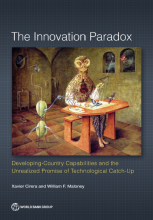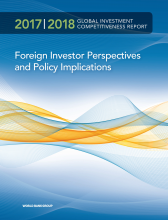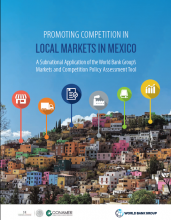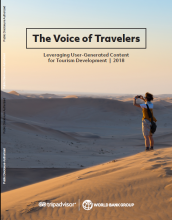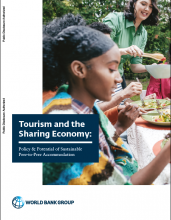The Innovation Paradox
The Innovation Paradox: Developing-Country Capabilities and the Unrealized Promise of Technological Catch-Up, the first volume of the World Bank Productivity Project, seeks to bring frontier thinking on the measurement and determinants of productivity to global policy makers. This report brings new data sources to explore the innovation “paradox”: despite the potential for very high returns, developing countries invest far less in adopting and inventing new processes and products than advanced countries. (October 2017)
Women and Tourism
Women and Tourism: Designing for Inclusion explains the rationale for integrating a gender lens into tourism development projects, and it includes a set of resources designed to help development professionals and project managers get started and find necessary data. This publication paves the way for more in-depth operational research and data collection on what works for empowering women in the tourism sector. (October 2017)
The Global Investment Competitiveness Report 2017/2018
The Global Investment Competitiveness Report 2017/2018: Foreign Investor Perspectives and Policy Implications presents novel analytical insights and empirical evidence on foreign direct investment’s drivers and contributions to economic transformation. The report provides insights from a variety of sources, including a new survey of 750 executives of multinational corporations investing in developing countries, extensive analysis of available data and evidence, and a thorough review of international best practices in investment policy design and implementation. (October 2017)
Dialogue for Climate Action
Dialogue for Climate Action: Designing Dialogue for Climate Change, developed by a group of public and private sector partners, provides guidance for countries as they implement the Paris Agreement. The paper proposes six fundamental principles to support the establishment and enhancement of dialogue at the global, regional, national, and local levels. These principles are focused on bringing the public and private sectors together as a single, well-structured platform from which challenges can be identified and solutions implemented. (November 2017)
Doing Business Reform Advisory : Ten Year Results
Document Date : January 01, 2020 Document Type : Working Paper The report presents findings, trends, and lessons learned from ten years of Doing Business Reform Advisory (DBRA) by the World Bank Group (WBG) between 2008 to 2018. The analysis is based on data from the Monitoring & Evaluation system of the WBG and the Doing Business database, as well as input from WBG staff and project counterparts. The report also provides insights on how the DBRA program has been implemented and how it evolved over the years.
Internet of Things: The New Government-to-Business Platform
Internet of Things: The New Government-to-Business Platform, explores the IoT phenomenon, examines evidence to see how the theoretical potential of IoT implementation matches up with the reality on the ground, and offers lessons from government agencies at the forefront of IoT implementation. (November 2017)
Investment Reform Map for Mongolia
Investment Reform Map for Mongolia: A Foundation for a New Investment Policy and Promotion Strategy sets forth the results of analytics and dialogue to develop the investment needed to attract the type of FDI that can help Mongolia fulfill its development vision. (July 2018)
Promoting Competition in Local Markets in Mexico
EFI’s markets and competition policy team published a note, Promoting Competition in Local Markets in Mexico: A Subnational Application of the World Bank Group’s Markets and Competition Policy Assessment Tool, launched in December 2018. It examines a policy gap between Mexico’s federal government, which has a solid competition policy framework in place, and subnational regulations in transport, agriculture, tourism, retail, and other sectors that are holding back the potential of local economies to grow and provide consumers with affordable goods.
The Voice of Travelers
The report explores how businesses and destinations can use UGC to reach potential consumers and drive business and explores the future applications of UGC to monitor business and destination health, improve service levels, and boost overall business performance. It also looks at how UGC can help reduce the barriers for low-income destinations to compete in a global arena and create inclusive business opportunities. The Voice of Travelers explores how UGC could lead to more inclusive outcomes for tourism at a global level. The report is designed as a primer on UGC, not as a comprehensive manual. It is designed to start a dialogue on leveraging UGC for inclusive and sustainable tourism development and to identify areas for future work.
Tourism and Sharing Economy
This report focuses on one disruptive force in the tourism industry: the emergence of peer-to-peer (P2P) accommodation. P2P accommodation occurs when individuals offer, in exchange for money, a room or an entire house for short-term accommodation. The rapid growth of this new product is shaking up the hotel industry and creating a new way to travel and interact with a destination and its community. The objectives of this report are to investigate the opportunities and challenges that P2P provides in developed and emerging destinations and to off er a set of recommendations to better use this new business model for sustainable and inclusive tourism. The report also sketches a research agenda for the near future. This report is written for destination managers, policymakers, and World Bank Group staff involved in the design and management of tourism operations. It is based on desk research, interviews with digital platform managers, and an in-depth study of the case of Jamaica.



